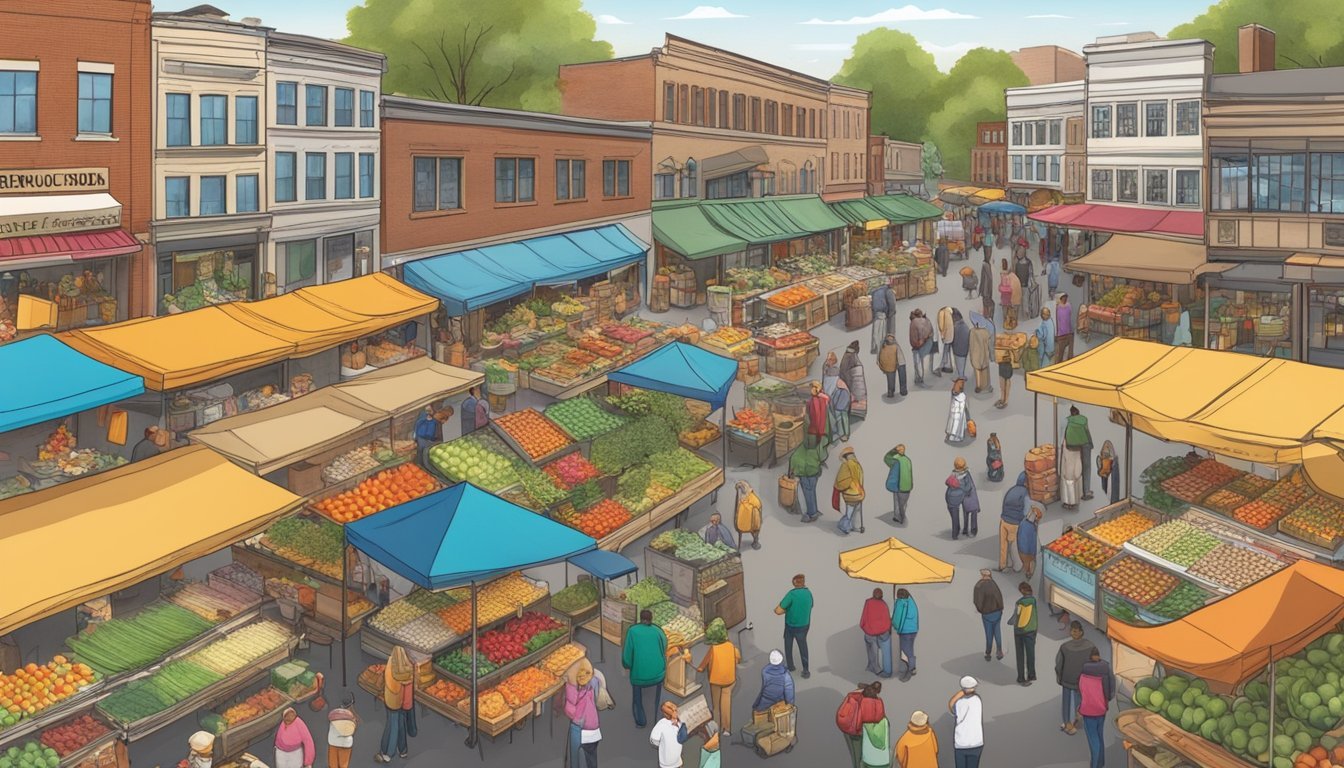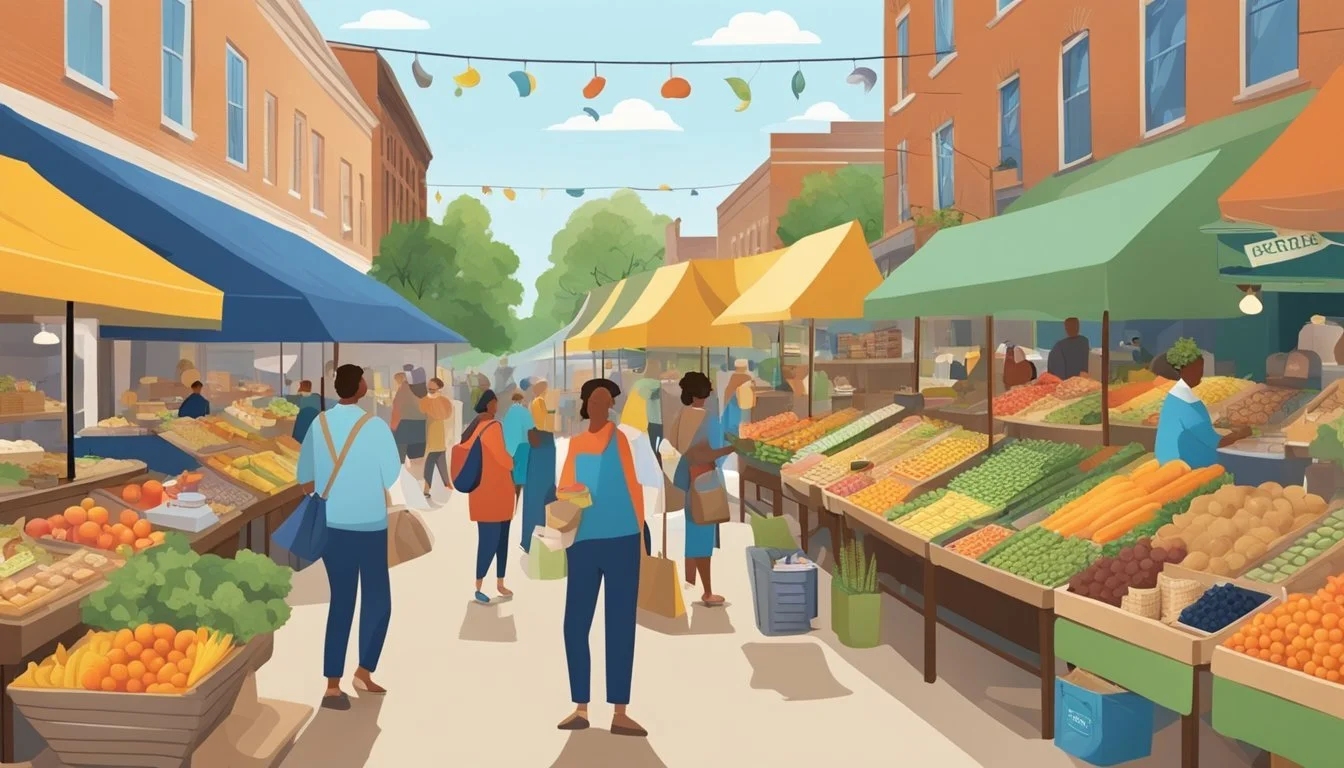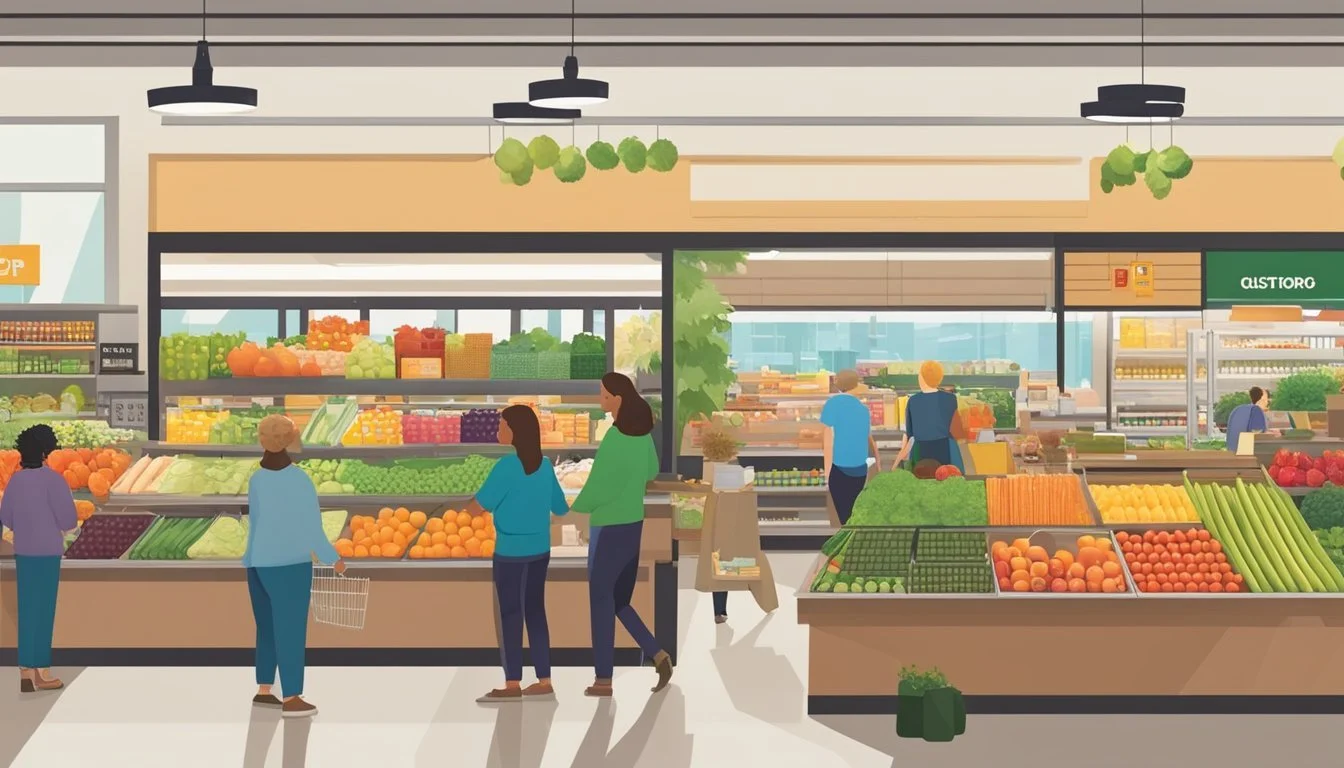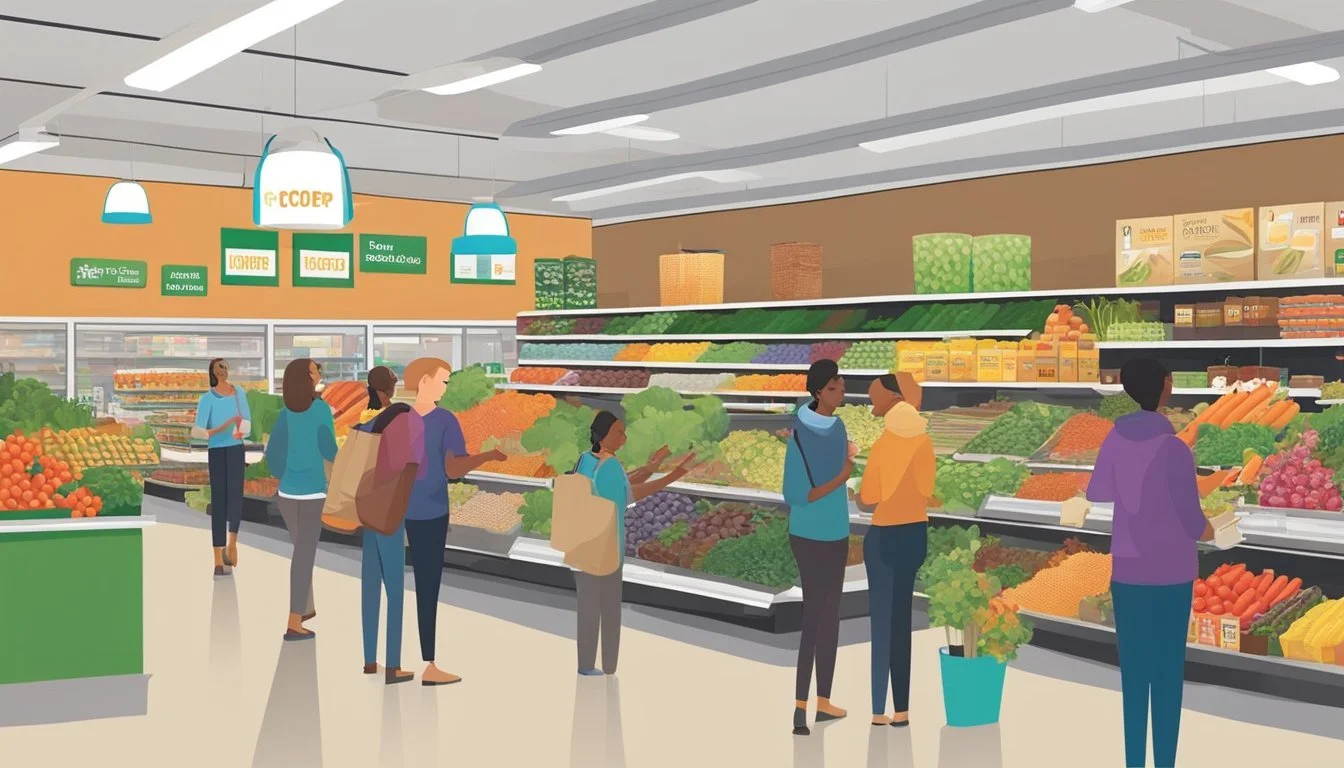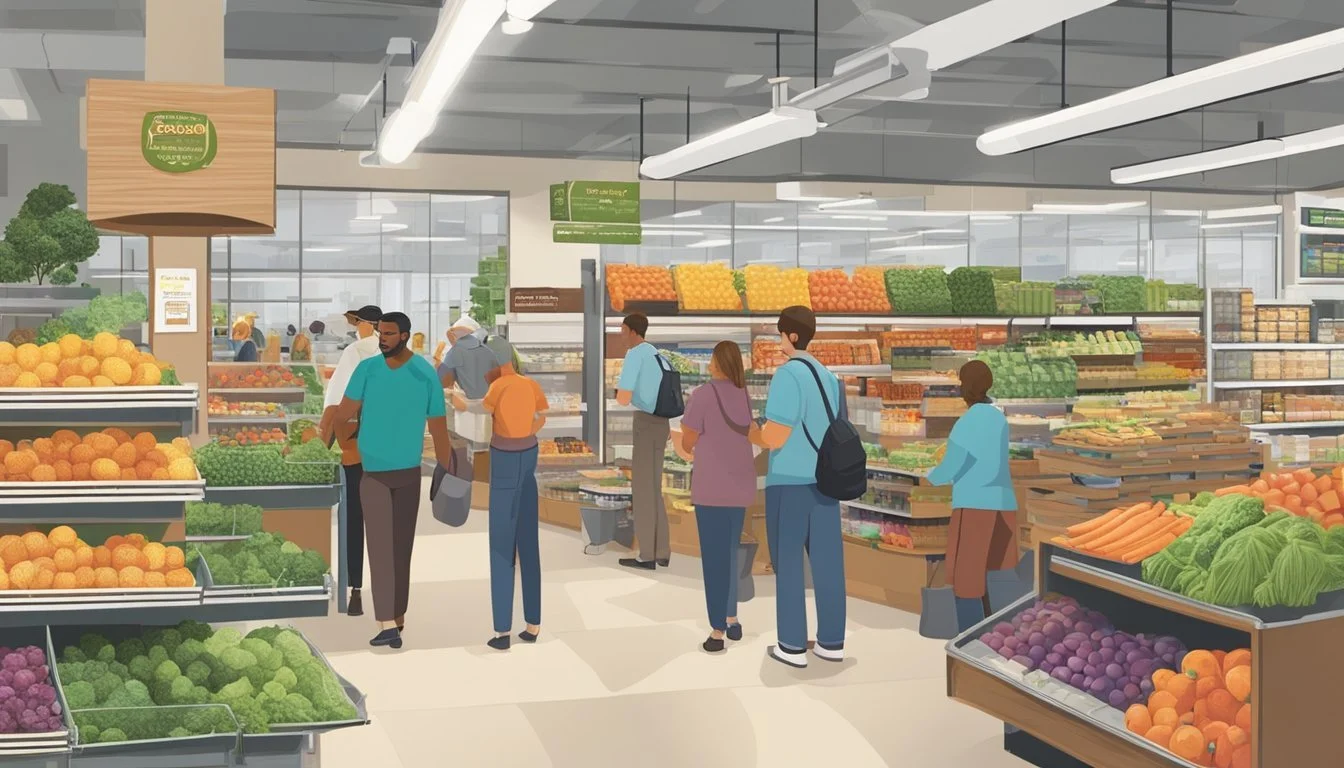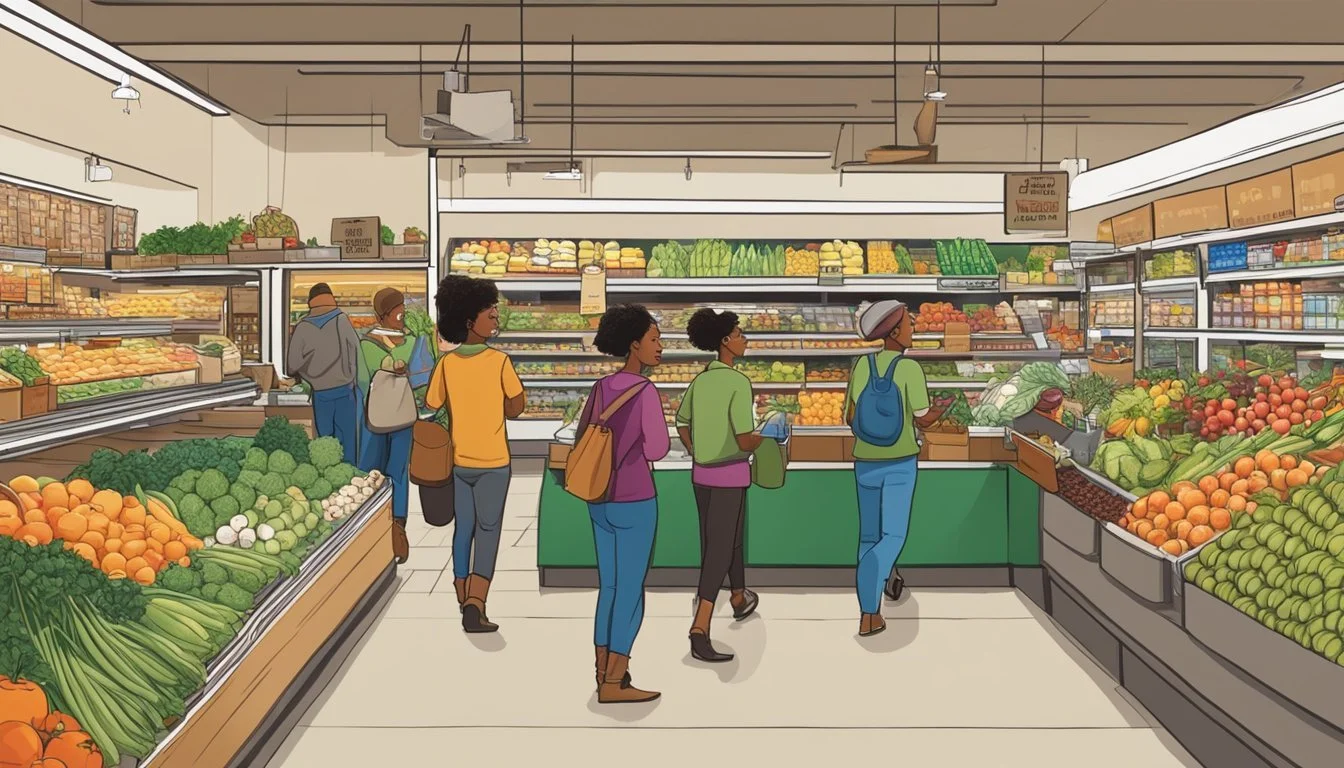Guide to Food Co-Ops in South Bend, IN
Your Essential Resource
Food cooperatives, or co-ops, offer a unique approach to buying food where the focus is on community and local sourcing rather than just profit. In South Bend, Indiana, establishments like the Purple Porch Food Co-op exemplify this model by providing an avenue for residents to access locally sourced and sustainable produce. These community-centered markets are not just a place to buy groceries; they are a meeting ground for like-minded individuals who value transparency in their food supply chain and seek economic opportunities that support local farmers and artisans.
The concept of a food co-op inherently supports economic collaboration and creates opportunities for communities to thrive. In South Bend, co-ops like Purple Porch aim to bolster the local economy by offering goods produced within the region, which helps to keep money circulating within the community. Members and non-members alike can purchase these goods, enjoy the social atmosphere, and participate in fostering a sustainable local food system.
South Bend's food co-ops extend beyond mere grocery shopping experiences. They often host events like farmers' markets, which foster direct interaction between consumers and producers. Purple Porch, for instance, holds a market day where the community can shop for fresh produce and artisanal items, as well as engage with neighbors over free coffee. These interactions at food co-ops reinforce the importance of community in creating a fair and transparent food cooperative, through which all members benefit from the shared support and economic opportunity.
What Is a Food Co-Op?
Food co-ops are community-centered grocery stores that are democratically owned and operated by their members. They prioritize local food sources and transparency in operations.
Core Principles of Co-Ops
Voluntary and Open Membership: Co-ops are open to all individuals willing to accept the responsibilities of membership without gender, social, racial, political or religious discrimination.
Democratic Member Control: Operated by members, they have equal voting rights (one member, one vote) and participate in decision-making.
Member Economic Participation: Members contribute equitably to, and democratically control, the capital of their cooperative.
Autonomy and Independence: Co-ops are autonomous, self-help organizations controlled by their members.
Education, Training, and Information: Co-ops provide education and training for members to contribute effectively to the development of their co-ops.
Cooperation Among Cooperatives: By working together through local, national, regional, and international structures, co-ops improve services, strengthen local food systems, and enhance trust and solidarity.
Concern for Community: Co-ops work for the sustainable development of their communities through policies and programs accepted by the members.
Benefits of Joining a Co-Op
Local Economy Support: Members often enjoy access to fresh, locally-sourced food, which supports local farmers and producers.
Democratic Influence: As a member of a co-op, individuals have a say in business decisions, reflecting a true community focus and promoting democracy within the marketplace.
Social Connection: Co-ops often become community hubs where trust is built among members who share a common goal of community enhancement.
Financial Savings: While co-ops are not primarily focused on profit, they often offer competitive pricing and member-only benefits, such as discounts or patronage dividends.
The Local Scene
The South Bend area boasts a dynamic local food scene that is embodied by community-focused initiatives like food co-ops that prioritize locally sourced and sustainable groceries.
History of South Bend Food Co-Ops
South Bend has a tradition of supporting local food networks through community food co-ops, which serve as a pillar of the region's commitment to sustainability and local economies. These co-ops typically emerge from the needs of local communities to access high-quality, locally-produced foods, and they often grow to become an integral part of regional food systems.
Purple Porch Co-Op Overview
Purple Porch Co-Op, situated at the heart of South Bend, operates as a grocery store, local food market, and café named Cafe Max. It's known for:
Local Focus: Purple Porch Co-Op ensures all market producers are within a 60-mile radius of South Bend.
Transparency: The co-op emphasizes transparency in sourcing and sustainability.
Community Engagement: It fosters community by connecting farmers directly with consumers.
Other Notable Food Co-Ops in the Area
While Purple Porch Co-Op stands out as a prominent example, South Bend's landscape includes other food co-ops that have yet to be as broadly documented. These co-ops share a dedication to supporting local groceries and embody a service-based attitude that strengthens local communities by providing access to quality food choices with a focus on regional sustainability.
Membership and Participation
Food Co-ops in South Bend, Indiana, offer community members the opportunity to become directly involved in a democratically governed marketplace. They emphasize economic opportunity, savings, and community engagement through unique membership structures.
How to Become a Member
Individuals interested in joining a food co-op like Purple Porch Co-op typically need to fill out an application and pay an annual membership fee. The fee structure may vary, but co-ops commonly offer different levels of membership to fit various needs and budgets.
Member Responsibilities and Benefits
Members are often required to contribute a certain amount of time working at the co-op, typically around 2.25 hours a week. Splitting this time with another member is sometimes an option. In exchange for their time and financial commitment, members may receive:
Discounts: A 15 to 20 percent discount on purchases is a standard benefit.
Democratic Governance: Members have a say in the co-op's decision-making process.
Economic Opportunity: Co-op members can save money while supporting local producers.
Community Engagement and Volunteering
Becoming a member of a food co-op is more than just a way to shop; it is an act of participation in the community. Volunteering at the co-op not only helps with its operation but also strengthens communal ties. Co-ops encourage members to participate beyond their required hours, fostering an environment where everyone has a stake in the local economy and food systems.
Shopping at Food Co-Ops
Food co-ops in South Bend, IN, offer a unique shopping experience focusing on community engagement and local produce. Customers can enjoy a variety of organic and locally sourced products, typically at competitive prices.
Navigating the Aisles
When first entering a food co-op, customers might notice that the layout is often intimate and community-oriented. Aisles are typically well-organized, making it easy to find bulk foods, baking ingredients, and Fair Trade products. Shopping can be a personal experience with clear signage and information on the origins of the products.
Finding Local Products
One of the highlights of food co-ops is their emphasis on local products. Shoppers can expect to find goods that are not only high in quality but also support local farmers and producers. Co-ops like Purple Porch Food Co-op in South Bend prioritize relationships with local consumers to enhance the market scene. Patrons can enjoy seasonal produce, artisanal bread, and other local items typically on days like Wednesday during market hours, further fostering community relations.
Understanding Pricing and Discounts
Food co-ops are known for their member-owned structure, which often allows for discounts for members while still providing access to cheap, healthy foods. Pricing can be transparent, and members might receive benefits such as sales on a rotating selection of items. Moreover, many food co-ops accept EBT to ensure that a broader community has access to wholesome food.
Specialty Foods and Products
In South Bend, Indiana, food co-ops cater to those seeking specialty foods, including organic, gluten-free, locally produced meats and dairy, as well as a broad selection of vegan and vegetarian goods. Each of these offerings is carefully curated to meet the specific nutritional and ethical preferences of the community.
Organic and Gluten-Free Options
South Bend food co-ops provide a variety of certified organic products that meet rigorous standards for organic farming and processing. They also offer an array of gluten-free items, ensuring that consumers with gluten sensitivities or celiac disease have access to safe, high-quality food choices.
Organic products: include fruits, vegetables, grains, and more.
Gluten-free options: cover staples such as bread, pasta, and baking ingredients.
Locally Produced Meat and Dairy
These co-ops take pride in sourcing locally produced meat and dairy, which supports the local economy and reduces the carbon footprint associated with transportation.
Meat: A selection of beef, pork, poultry, and more, sourced from local farms.
Dairy: Includes milk, cheese, yogurt, and other dairy items from nearby producers.
Selection of Vegan and Vegetarian Goods
A diverse range of vegan and vegetarian options is available for those who follow plant-based diets or are looking for meat alternatives.
Vegan goods: encompass dairy-free cheeses, plant-based milks, and meat-free proteins.
Vegetarian selections: cover a variety of products from snacks to complete meal solutions.
This section reflects a snapshot of what consumers can expect to find when they shop for specialty foods at South Bend's food co-ops, highlighting their commitment to offering an inclusive set of products.
Supporting Local Economy
Food cooperatives in South Bend play a significant role in nurturing the city's economic landscape by fostering local business growth and maintaining symbiotic relationships with area farmers and producers.
Impact on South Bend's Economic Growth
Food co-ops create economic opportunities by sourcing and selling local food, thereby retaining spending within the community. The Purple Porch Food Co-op, a prominent player in this space, has been instrumental in circulating consumer dollars within the local economy. It amplifies the impact by providing a marketplace for local farmers to sell their produce directly, increasing their revenue and supporting the economic stability of South Bend families.
Relationship with Local Farmers and Producers
The cooperative model established by organizations like the Purple Porch is more than a retail space; it's a hub for local farmers and producers to connect with consumers. This relationship bolsters the local food system and sustains the agricultural community in South Bend. By working together, co-ops ensure that local producers receive fair compensation, fortifying the family-run farms' viability and longevity. Local residents benefit from access to fresh, regionally sourced foods, thus enriching the community’s health and economic diversity.
Educational Resources and Events
Food Co-ops in South Bend, Indiana, provide an enriching platform for learning and community engagement through a variety of educational resources and events. These activities are crucial for fostering a knowledgeable community that values sustainable practices, healthy eating, and democratic governance.
Workshops and Cooking Classes
Co-ops commonly offer workshops and cooking classes that are open to the public, aiming to educate members and non-members on healthy and sustainable food choices. Sessions may include topics ranging from organic farming research to family-friendly recipes, emphasizing the use of local produce:
Organic Farming Workshops: Participants learn about sustainable agriculture methods.
Family Cooking Classes: These involve simple, nutritious recipes perfect for busy households.
By teaching these skills, co-ops empower individuals to make informed food decisions and spread this knowledge through word of mouth, strengthening community ties.
Community Events and Outreach
Community events and outreach programs are essential in promoting the co-op’s mission. They provide opportunities for members and the broader community to engage with the co-op beyond just shopping. Here are some examples of such events:
Local Farmer Meet and Greets: Connects the community with the people who grow their food.
Seasonal Food Festivals: Celebrate local harvests and introduce new seasonal products.
These events are designed under democratic governance principles, often involving input from all members of the co-op, to ensure that they serve the community's needs effectively.
Sustainable Practices and Products
In South Bend, Indiana, food cooperatives emphasize both environmental stewardship and the availability of eco-friendly products to encourage a sustainable community.
Environmental Impact of Co-Ops
Food cooperatives in South Bend adopt models that significantly reduce the environmental footprint associated with food production and distribution. By pooling resources collectively, local farmers are able to offer fresh produce and goods directly to consumers, reducing the need for long-distance transportation. This method not only supports the local economy but also cuts down on carbon emissions. The focus on locally sourced food implies that food travels a shorter distance from farm to table, maintaining freshness and reducing spoilage.
Eco-Friendly Products Offered
Eco-friendly products at South Bend food cooperatives are a testament to their commitment to sustainability. These products typically include:
Certified Organic: Items are grown without the use of synthetic pesticides or fertilizers, supporting soil health and biodiversity.
Fair Trade: Products ensure equitable trade practices and fair payment to producers, often from the regional area.
Locally Sourced Food: By offering goods produced within the Michiana area, food co-ops foster a sustainable loop of production and consumption.
Through these practices, the co-ops not only provide healthier options to the South Bend community but also contribute to a more sustainable and resilient local food system.
Additional Amenities and Services
Food co-ops in South Bend, Indiana, offer more than just grocery shopping; they provide spaces for community engagement and ways for members to save money through various programs.
Co-Op Cafes and Gathering Spaces
Many food co-ops in South Bend have cafes offering coffee and locally-sourced food, serving as convenient gathering spaces for community members. These spaces often become a hub for connection and collaboration among local consumers and producers, echoing the community-centric ethos of the co-op model.
Membership Deals and Discounts
Members of food co-ops can enjoy exclusive deals and discounts that help them save money while supporting local agriculture. Typically, members receive:
Discounts on regular purchases
Special markdowns during member appreciation days
Savings on classes or events held by the co-op
The benefits extend beyond savings, as members often have a say in co-op affairs, giving them direct influence over the services provided and products offered.
Technology and Food Co-Ops
The incorporation of technology into Food Co-Ops in South Bend has bolstered both the convenience of shopping and the sense of community for its members. Online platforms streamline operations and social media fosters trust and engagement amongst consumers and producers.
Utilizing Online Platforms
Food Co-Ops have integrated technology by adopting online platforms. Websites like that of the Purple Porch Co-op feature comprehensive online marketplaces where customers can place orders. This convenience greatly simplifies the process for consumers to gain access to local organic produce from regional suppliers. Additionally, these platforms can offer a range of functionalities such as membership management and event scheduling, further serving the community.
Features of Online Platforms:
E-commerce for local produce and goods
Membership registration and management
Event and community program listings
Social Media and Community Building
Social media plays a pivotal role in community building for Food Co-Ops. Platforms such as Facebook and Instagram allow them to connect with their members, share stories from local farmers, and post updates about new products and events. These interactions nurture a sense of belonging and trust, as consumers can see the transparent operations and values driven missions of the co-op.
Social Media Strategies:
Regular posts showcasing local farmers and produce
Updates on Co-op events and member meetings
Engagement with members through comments and messages
Challenges and Considerations
Food co-ops in South Bend face specific challenges tied to the area's cost of living and the balance between offering variety and specialization. These considerations impact both the operational efficiency of the co-ops and their accessibility to the community.
Cost of Living and Food Accessibility
The cost of living in South Bend, IN, influences the operation of food co-ops, especially in making healthy foods affordable. While co-ops aim to provide cost-effective alternatives to commercial grocery stores, additional factors such as the economic disparity between rich and poor must be accounted for to ensure access across all demographics.
Affordability: There is a continuous effort to balance food prices with the reality of the local cost of living.
Accessibility: Co-ops must strategize to serve neighborhoods where fresh, healthy food options might otherwise be limited.
Balancing Variety and Specialization
Food co-ops strive for a balance between offering a wide range of products and focusing on specializations, such as locally sourced or organic foods. Both variety and specialization are crucial for meeting the diverse needs of South Bend residents, from staples to unique dietary requirements.
Variety: Ensures all members find the goods they need, from daily staples to occasional treats.
Specialization: Differentiates co-ops from larger retailers by providing unique, local products not easily found elsewhere.
Future of Food Co-Ops in South Bend
In South Bend, food co-ops like the Purple Porch Cooperative are expected to continue evolving through a focus on sustainability and community engagement, leveraging their unique position to offer economic opportunities to local families.
Predicting Trends and Changes
As food co-ops gain traction in South Bend, they are likely to adopt regenerative agriculture practices, which have been identified as beneficial for slowing climate change while also enhancing soil health. This adoption aligns with the broader trend of promoting sustainable food systems that support both the environment and local economies. Food co-ops could also start offering more educational resources to their communities, teaching about the importance of organic farming and its impact on both health and the environment.
Local food systems are expected to become more robust as co-ops work to decrease the distance between the producer and consumer. This localization helps families access fresh, quality produce and supports family farmers by providing a stable market for their goods.
Fostering Growth and Adaptation
The growth of food co-ops in South Bend is anticipated to span various dimensions, including growth in membership and an expansion of the variety of products offered. They can provide significant economic opportunities by returning surplus to members and attracting a customer base that values community over corporate grocery alternatives.
To adapt to changing market conditions, food co-ops are expected to enhance their user experience both in-store and with digital enhancements, allowing them to remain competitive.
The focus on community will continue to strengthen as food co-ops build deeper connections within South Bend, reinforcing their mission to support local producers and families. They play a critical role in maintaining a resilient local food economy, with the additional benefit of creating a sense of community ownership and pride.


